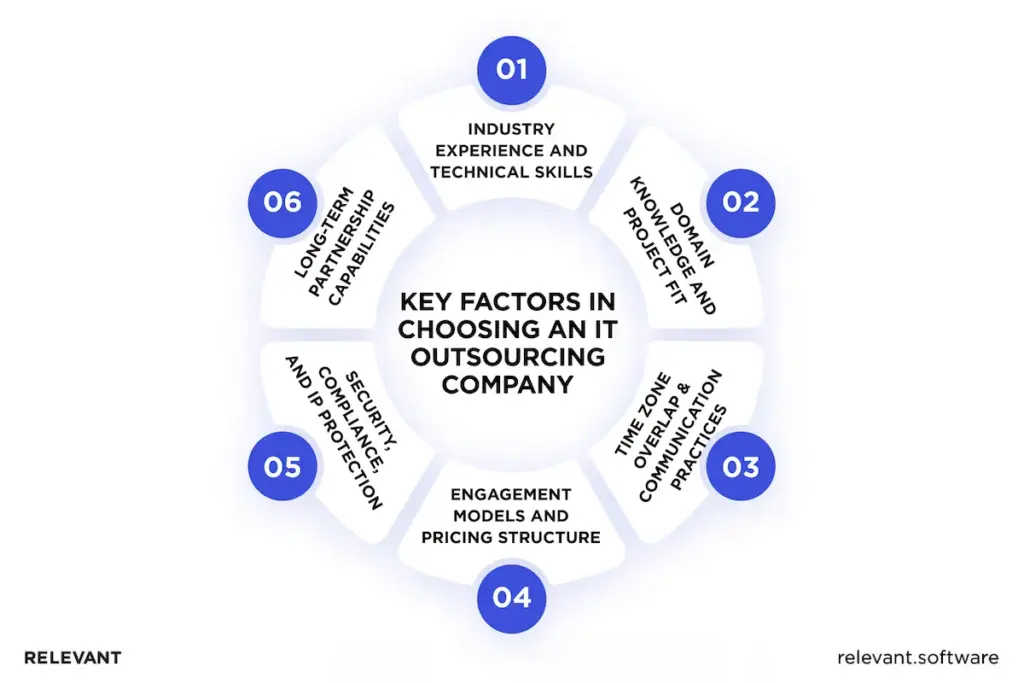Top IT Outsourcing Companies in 2026 with Proven Delivery

Whether a company prepares for a product launch or seeks to reduce pressure on internal teams, IT outsourcing services offer one of the fastest and most reliable ways to move forward. According to Deloitte’s 2024 survey, over 76% of organizations now rely on external partners for critical technical functions, such as software development, QA, and UI/UX design. The most effective IT outsourcing companies, however, go further. They integrate with product teams, meet engineering benchmarks, and maintain accountability well beyond the initial sprint.
But how can decision-makers recognize a partner that consistently performs at a high level? The key is informed selection, grounded in clear insight. This guide highlights firms with a proven ability to deliver in complex, high-stakes environments. For organizations driven by outcomes, these companies offer a dependable, capable foundation for long-term digital success.
from 25 countries outsourced software development to Relevant
We provide companies with senior tech talent and product development expertise to build world-class software.
Comparison table: Top IT outsourcing companies at a glance
We reviewed dozens of candidates to highlight the IT outsourcing companies that demonstrate real delivery strength. This handpicked table gives you a side-by-side view of each provider’s service areas, delivery geography, clients, and reviews.
For added context, the section below provides descriptions of each company. It outlines core specializations, delivery strengths, and the areas where each software vendor creates the most value.
| Company | Core services | Core locations | Ratings/reviews | Notable clients |
| 1. Relevant Software | Full-cycle development, technology consulting, cloud, AI/ML, IoT | Ukraine-based with global delivery (offices in Poland, the USA, and Spain) | Clutch 4.9/5 with 30 reviews | AstraZeneca, Volkswagen, Norwegian, Ossur |
| 2. BairesDev | Custom software, staff augmentation, QA, cloud, AI | USA, Argentina, Brazil, Mexico, Colombia, Spain | Clutch 4.9/5 with 60+ reviews | Google, Pinterest, Adobe, J&J |
| 3. Accelerance | Provider selection, due diligence, partner governance | HQ USA; partner network across 30+ countries in LATAM, CEE, APAC | Clutch “Gold Verified,” avg. 5.0/5; 30+ public reviews | Find.com, AdRoll, Epiq Systems, RateMyAgent |
| 4. Capgemini | Consulting, digital engineering, cloud, data & AI, SAP | Global delivery network across Europe, the USA, and APAC | Glassdoor 3.8 | Airbus, Santander, Telefónica |
| 5. Andersen Inc. | Custom software, staff augmentation, web and mobile development | Europe, the US, and Asia | Clutch 4.9/5 with 120+ reviews | Siemens, S&P Global, Ryanair |
| 6. Oxagile | Custom software with strength in video streaming, AdTech, AI, and data | USA, Poland; CEE hubs | Clutch 5.0/5 with 10+ reviews | Discovery, Vodafone, Panasonic, Google |
| 7. DBB Software | Full-cycle development, MVP development, AI/ML, Cloud infrastructure, Digital transformation | Based in Poland, Krakow, with development centers in Poland and Eastern Europe | Clutch 5.0 with 29 reviews | Ford, Philips, JLL, DispatchHealth, Doctify, RedAlpine |
| 8. X-Team | Long-term team extension for web, mobile, cloud; senior engineers on demand | Global, fully remote | Clutch 4.9/5 | Riot Games, Fox, Coinbase, WSJ |
| 9. Software Mind S.A. | Dedicated teams, product engineering, cloud, data, AI/ML, DevOps | Poland HQ; US, Romania, Moldova, LATAM | Clutch 4.9/5 with 50+ reviews | Retail Insight, Alianza, Baillie Gifford & Co. |
| 10. Accenture | Strategy, technology, cloud, data, security, managed services | 50+ delivery locations worldwide | Glassdoor 3.6 | Air France KLM, Pfizer, Nestlé |
Key factors to consider when choosing an IT outsourcing company
Outsourced software development can speed up delivery, reduce costs, and give access to skills that may be unavailable in-house. But these benefits only come with the right partner. A poor choice often results in missed deadlines, misaligned expectations, and technical debt. The top IT outsourcing companies avoid these pitfalls by working as true extensions of the product team, focused on outcomes, responsive to business needs, and committed beyond the first release.
So, how to understand if a partner is a fit? Evaluate the fundamentals: technical capability, communication structure, domain expertise, and alignment with business priorities.

Industry experience and technical skills
Selection of the right IT outsourcing company begins with a clear view of its technical foundation. A strong partner writes clean code, builds scalable systems, applies automated tests, and manages infrastructure with precision. Whether the goal requires full-cycle product development or focused custom software delivery, technical depth remains essential.
Before signing an agreement, verify that the team follows modern engineering practices, ensures high performance, and upholds strict infrastructure security.
What to check in their past work:
- Projects built for similar industries or levels of system complexity
- Fluency in your technology stack: languages, frameworks, cloud service providers
- Proven ability to build secure, scalable platforms with high availability
- Engineers with ownership of architecture, not only development tasks
- Examples where smart technical decisions led to performance gains or cost savings
Whether supporting a small business or a large enterprise, the best IT solutions come from those who already know how to deliver under pressure.
Domain knowledge and project fit
An outsourcing team that already understands your industry doesn’t need weeks of orientation. They know what matters to your customers, how systems typically behave, and which constraints to plan for in advance. This shortens feedback cycles, reduces rework, and ensures the technology solutions actually reflect your core business services.
For example, in financial services, this may require expertise in KYC processes or ledger systems. In healthcare, it may involve strict adherence to PHI access boundaries or HIPAA regulations. Even across broader digital transformation efforts, relevant domain knowledge distinguishes a generic vendor from one that creates long-term value.
What to look for:
- Engineers or consultants with an industry-specific background
- Discovery sessions tailored to your product and user journey
- Past success in the development of platforms under similar constraints
- Familiarity with key regulations (e.g., GDPR, HIPAA, PCI DSS)
Time zone overlap and communication practices
Even the best IT team struggles when clarity breaks down. Miscommunication causes delays, scope changes go unnoticed, and missed handoffs ripple across sprints. An experienced IT outsourcing company sets up structured sync routines, defines ownership early, and ensures your engineers stay looped into progress, no matter the distance.
Clear English is only part of the equation. What matters more is how well expectations, delivery status, and feedback pass between teams. The right partner builds communication into the workflow, not as an afterthought but as a core function.
Here is your checklist:
- Set overlap hours with dedicated counterparts
- Use a routine that covers sprint check-ins, backlog review, and roadmap updates
- Ensure clear ownership of risks, blockers, and delivery status
- Map roles to your project tools (Jira, Slack, GitHub)
- Confirm strong written and spoken English across all client-facing roles
Whether your product enters discovery or expands rapidly, fast and structured communication keeps delivery clear and IT issues visible. It reduces labor costs, shortens release cycles, and gives teams space to move forward without confusion.
Engagement models and pricing structure
Selecting the right engagement model requires more than a budget decision. It defines how both sides collaborate throughout the partnership. Without clear roles, defined billing terms, and documented scope-change rules, even capable vendors may face friction. A well-structured model removes blockers, prevents surprises, and ensures alignment. Below is an overview of the most common models and how each affects visibility, control, and accountability.
Time & Materials
This flexible model suits early-stage product work, mobile app builds, or platform upgrades where priorities evolve. It fits situations where roadmaps take shape over time. Teams meet weekly, and pricing adjusts based on actual hours. This model enables fast changes, real feedback cycles, and room for iteration, which makes it ideal for innovation-focused projects.
Dedicated teams
If long-term product growth or infrastructure modernization is your focus, dedicated teams offer consistency. You get an embedded extension of your IT team, which is ideal for web development, cloud integration, or Internet of Things (IoT) initiatives that require domain knowledge and continuity. This model allows outsourcing providers to build deep familiarity with your systems, which leads to a smooth transition and fewer miscommunications.
Fixed price
For projects with clearly defined features and acceptance criteria, fixed-price contracts work well. They offer predictability and simplify planning, particularly for smaller efforts like standalone software services or compliance upgrades. However, without built-in flexibility, this model can introduce risk if the business environment shifts mid-project. It’s best used when every requirement is crystal clear.
What to request before selection:
- Transparent role-based rate cards tied to geography and seniority
- Sample invoices that map actual project work to costs
- Written procedures for scope changes to prevent disputes
- Delivery reports that link progress to timeline and budget
- Guidance from an experienced IT consulting services team on the model that fits both the current phase and future goals
For deeper comparisons across models, read our guide on outsourcing models.
Security, compliance, and IP protection
In regulated sectors like fintech and healthcare, security defines the entire delivery process. The right company will design secure systems from the ground up, embedding risk controls into architecture, credentials, and workflows. The best IT security outsourcing companies don’t wait for a checklist; they build with audits, incident response, and legal clarity already in mind.
What to confirm:
- Certifications such as ISO 27001, SOC 2, or HIPAA compliance
- Documented secure development lifecycle (SDLC) processes
- Access control, credential rotation, and infrastructure isolation
- Contract terms that define IP transfer, confidentiality, and invention rights
- Documented record of past audits, penetration tests, and compliance reviews
A company that reduces labor costs while maintaining trust, auditability, and ownership provides a strong foundation for scalable software development. This creates measurable cost efficiency with long-term strategic value.
Long-term partnership capabilities
Some vendors deliver code. Others build relationships that evolve with the business. The most valuable outsourcing partnerships continue to create impact after launch, through post-launch support, team growth, roadmap shifts, and market adaptation.
The right company goes beyond MVP deployment. It supports the full product lifecycle, ensures smooth knowledge transfer during engineer transitions, and adjusts as the platform expands. This approach limits disruption, protects momentum, and allows internal teams to focus on scale.
Look for these indicators:
- Low turnover on core roles or stable delivery leads
- Handoff playbooks and product documentation
- Options for scaling teams or support levels post-launch
- Quarterly check-ins aligned with your strategic goals
- Evidence of 12+ month partnerships with companies of your size
True partnership doesn’t add overhead. It unlocks your core team, extends your custom software development capacity, and keeps you competitive without inflating costs. That’s how the best outsourcing teams stay relevant and indispensable.
Related: In house development vs outsourcing.
The 10 best IT outsourcing companies right now
Plenty of vendors promise smooth delivery and skilled teams. Fewer prove it over years of complex, high-stakes work. We reviewed dozens of firms with active portfolios in fintech, healthcare, and enterprise SaaS, and focused on those that consistently meet real-world demands. These ten firms combine engineering depth, domain fluency, and steady hands under pressure, exactly what product leaders need in 2026.
1. Relevant Software
Global presence: Relevant Software operates from Ukraine, Poland, the USA, and Spain, which together support clients across North America, Western Europe, the Nordics, and the Middle East. Organizations choose Relevant as a reliable IT software outsourcing company for rapid delivery and as a strategic advisor on digital transformation, architecture choices, and roadmap execution.
Years in business: Founded in 2013, Relevant Software has more than twelve years of commercial work.
Core competencies: Relevant Software provides end-to-end custom software development through dedicated teams with full ownership across product delivery, QA, and DevOps. The company offers technology consulting, IoT solutions, cloud services on AWS, Azure, and GCP, and AI/ML capabilities powered by data insights.
Notable clients:
- AstraZeneca: built an AI-enabled clinical-trial data portal with role-based access, audit trails, and faster review cycles across study teams.
- Össur: refactored iOS apps and added features, which ensure seamless data migration and offline-first operation with local storage and auto sync.
Why they’re a top choice: Public feedback shows a 97% client satisfaction rate, with customers praising the company’s professionalism, flexibility, and well-organized project management. Many also highlight responsive communication, close alignment with client teams, and delivery that stays on budget and on schedule.
2. BairesDev
Global presence: HQ in San Francisco with delivery centers across Argentina, Brazil, Mexico, and Colombia, plus a presence in Europe. Close time-zone overlap helps product owners stay in sync without late-night stand-ups, a feature that keeps the firm on shortlists of top outsourcing companies that target North American markets.
Years in business: Founded in 2009 with more than a decade of large-scale delivery.
Specialties: BairesDev supplies custom software, staff extension, QA, DevOps, and cloud projects. Large clients treat BairesDev as an IT outsourcing service provider that supplies full product teams; smaller companies outsourcing IT services tap the company for a handful of senior contributors who can step into an existing backlog.
Notable clients:
- Google: nearshore engineers extended core Ads features, increased release speed, and improved code quality.
- Adobe: partnered with BairesDev to upgrade its platform toolset, resulting in improved build reliability, faster development cycles, and smoother rollout of new features.
Why they’re a top choice: BairesDev ranks among the top IT outsourcing companies by combining nearshore access with enterprise-level discipline. Leaders receive predictable capacity, transparent pricing, and a direct path from MVP to scale without an internal hiring cycle. For organizations that rely on outsourced IT services and prioritize speed, senior talent, and smooth handoffs, BairesDev offers a reliable model with minimal friction and consistent results.
3. Accelerance
Global presence: U.S.-based advisory with a vetted partner network across Latin America, Central and Eastern Europe, and the APAC region. Accelerance reports that it has assessed more than 8,000 development firms worldwide and certifies approximately the top 1%. This model enables rapid alignment with qualified partners across key global markets.
Years in business: Founded in 2001.
Specialties: Discovery and vendor curation, technical due diligence, and active performance oversight. Accelerance grants access to multiple pre-qualified IT outsourcing firms for product development, data and cloud services, QA, and managed support, without the need for the client to set up a sourcing function.
Notable clients/:
- RateMyAgent: Accelerance sourced a nearshore squad in under two weeks, set SLAs, and lifted delivery pace.
- Find.com: Selected to drive mobile growth, enhance development speed, and boost code quality through centralized oversight.
Why they’re a top choice: Executives seeking a single, accountable partner for vendor selection and oversight highly rate Accelerance among IT outsourcing service providers. The certified network streamlines staffing, expands geographic options, and maintains performance measurability under clear SLAs.
4. Capgemini
Global presence: With more than 350,000 staff across fifty countries, Capgemini ranks among the largest information technology outsourcing companies on the planet. Delivery hubs in Europe, North America, and India enable around-the-clock operations for leading global enterprises.
Years in business: Established in 1967 with a long-standing record in consulting and technology services.
Specialties: Consulting, digital engineering, enterprise platforms, cloud, data and AI, and managed services. The group runs large, multi-tower portfolios with mature governance and audit-ready processes.
Notable clients:
- Airbus: Selected Capgemini to lead a large-scale cloud-first transformation across its Commercial Aircraft and Helicopters divisions, supported by a fully managed core cloud infrastructure.
- Santander: Capgemini Spain maintains an active collaboration with major Spanish enterprises such as Santander, with current programs focused on cloud and data modernization.
Why they’re a top choice: Capgemini supports complex, multi-country initiatives that require EU-grade compliance, industry-specific expertise, and full-cycle execution. Its global presence, standardized controls, and PMO-aligned governance place the firm among the leading information technology outsourcing companies trusted with enterprise-scale transformation.
5. Andersen Inc.
Global presence: EU-headquartered with offices across Europe and the United States. Andersen serves clients in the US, UK, and wider Europe, with 18+ office locations and 3,500+ in-house experts.
Years in business: Since 2007.
Specialties: Custom web and mobile application development, staff augmentation, cloud and DevOps engineering, and QA services. Andersen emphasizes secure SDLC, automation, and clear documentation, especially suited to regulated environments.
Notable clients:
- Siemens: long-term software development and modernization support for industrial systems.
- Ryanair: engineering support for digital products across booking and operations.
Why they’re a top choice: Andersen ranks among the top IT outsourcing companies due to strong client trust. The company ensures consistent delivery through disciplined handoffs, clearly defined roles, and proven processes. Long-term partnerships in finance, healthcare, and industrial tech highlight Andersen’s ability to meet compliance standards while upholding delivery speed. This positions Andersen as a dependable IT support outsourcing partner for complex, high-stakes platforms.
6. Oxagile
Global presence. Oxagile operates with headquarters in New York, USA, and a major delivery center in Warsaw, Poland, with a broader presence across Eastern Europe and the UK. This structure supports clients in both North America and Europe, with strong overlap in working hours.
Years in business: Since 2005.
Specialties: The company builds video streaming platforms, OTT services, AdTech systems, and real-time analytics pipelines. With deep expertise in low-latency and DRM systems, device testing, and performance tuning, Oxagile also supports AI and big data integration.
Notable clients:
- Discovery: Delivered OTT and FAST streaming solutions that support live and on-demand video for millions of users.
- Vodafone: Built a BI and analytics platform for telecom services that combines real-time data flow and high scalability.
Why they’re a top choice: Oxagile shines when media, telecom, or streaming quality is mission-critical. The team engineers for minimal latency, cross-device consistency, and massive concurrent scale. Deep domain knowledge in video and real-time workloads, paired with solid test automation and observability, make it a go-to among outsourced IT companies for high-performance, media-centric product builds.
7. DBB Software
Global presence: DBB Software operates from Poland, with headquarters in Krakow and development centers in Poland and Eastern Europe. Founded by five .NET developers in Ukraine, the company has grown to 100+ engineers serving clients across North America, Western Europe, and the Nordics. Organizations choose DBB Software as an IT outsourcing partner for its accelerated delivery model, offering the option to leverage a proprietary repository of pre-built solutions that can accelerate time-to-market by up to 50%.
Years in business: Founded in 2015, DBB Software has more than a decade of commercial experience and maintains an average client relationship of 6+ years, with 80% of clients staying for seven years or longer.
Specialties: DBB Software delivers full-cycle custom software development through dedicated teams with expertise in web and mobile development, DevOps engineering, AI/ML integration, and cloud infrastructure on AWS. The company holds AWS Select Partner status along with Microsoft Azure, MongoDB, and GitHub certifications. Industries served include e-commerce, healthcare, real estate, fintech, and logistics.
Notable clients:
- JLL: modernized global property management operations by building reliable AWS-based infrastructure, dynamic dashboards, and interactive geospatial features, scaling the platform across APA, MENA, and China regions with enhanced security and data protection.
- DispatchHealth: developed 17 Golang microservices covering patient data, insurance payers, risk stratification, and clinical workflows, introducing gRPC for fast service-to-service communication, reducing call center costs, and increasing consumer growth.
Why they’re a top choice: Clutch reviews highlight DBB Software’s technical expertise, on-time delivery, and transparent communication. Clients praise the team’s responsiveness, proactive collaboration, and high-quality code at competitive rates.
8. X-Team
Global presence: X‑Team operates as a fully remote, globally distributed team that supports clients across multiple time zones. The company fills talent gaps in the Americas, EMEA, and APAC with teams that align with U.S., Latin American, and European work hours. This model allows a swift response to urgent blockers or sprint requirements without delay.
Years in business: Since 2006.
Specialties: Long-term team extension for web, mobile, APIs, and cloud. X-Team adds senior contributors who ship code, support design discussions, and keep tickets moving through the pipeline.
Notable clients:
- Riot Games: Over 120 senior engineers supported system modernization, introduced automation tools, and ran LLM prototypes. The team migrated legacy services and improved player experience across platforms.
- Coinbase: X‑Team engineers accelerated API delivery and improved security under a tight release schedule. Their work strengthened cloud infrastructure and expanded Go-based backend systems.
Why they’re a top choice: X‑Team stands out for its ability to deploy experienced engineers within days, adapt to existing workflows, and sustain development momentum. The team maintains clear communication, reliable output, and strong retention. These qualities place X‑Team among the top IT outsourcing companies for organizations that require flexible, senior-level support with minimal friction.
9. Software Mind S.A.
Global presence: Founded in 1999 with headquarters in Kraków, Poland; delivery teams across Europe and the Americas. Software Mind serves clients in the US, UK, and wider Europe and lists 14+ delivery centers (Poland, US, Romania, Moldova, LATAM).
Years in business: Since 1999.
Specialties: Dedicated teams, product engineering, cloud and data platforms, AI/ML, DevOps, and automation testing, supported by nearshore and US-nearshore models.
Notable clients:
- Alianza: Software Mind supplied additional engineering capacity to accelerate a cloud communications backlog and speed delivery.
- Travel Counsellors / Branch: public client testimonials appear in Software Mind’s case study hub, highlighting long-term product support and capacity expansion.
Why they’re a top choice: End-to-end teams cover UI/UX, architecture, automated testing, and production releases, then add AI features when they create measurable value. Knowledge transfer and steady delivery make Software Mind a reliable choice among IT support outsourcing companies for long-term platforms in telecom, finance, and travel.
10. Accenture
Global presence: As one of the largest outsourcing companies, Andersen operates in more than 50 countries and over 200 cities, with active projects in more than 120 markets. Its global delivery centers provide 24/7 coverage and support large-scale initiatives in finance, telecommunications, energy, and public sector operations.
Years in business: Operated under the Accenture brand since 1989.
Specialties: Strategy and technology services, digital engineering, cloud, data, cybersecurity, and managed operations, coordinated through a global delivery network.
Notable clients:
- Air France-KLM: Accenture migrated over 350 applications to the cloud and, with Google Cloud, built a generative AI “factory” to speed AI model development and operational deployment.
- Pfizer: Accenture modernized Pfizer’s cloud infrastructure for life sciences workflows and helped launch “Health Answers by Pfizer,” a generative AI-powered consumer health assistant
Why they’re a top choice: Accenture is well-suited for enterprise initiatives that cover multiple regions and service areas. Leaders get sector specialists, audit-ready controls, and measurable outcomes across cloud, data, security, and managed services. Complex estates often include varied assets, several beneficiaries, or complicated legal and tax considerations, and typically require professional guidance to manage the administration process effectively.
Shift toward nearshoring and hybrid models
In recent years, companies have redefined their IT outsourcing strategies. Rather than relying solely on distant offshore vendors, many now adopt nearshore partnerships or combine multiple models. The objective extends beyond cost reduction; it includes faster collaboration, clearer communication, and stronger operational control.
Nearshore models offer time zone alignment, which reduces delays, shortens feedback cycles, and improves coordination across digital services. Hybrid structures, where some IT functions remain internal while external providers handle others, allow teams to maintain focus. Larger enterprises gain flexibility, while smaller firms access advanced technologies such as cloud platforms without building entire departments.
This model also addresses gaps in technical expertise. Whether a company needs to maintain cloud systems, develop mobile applications, or strengthen information security, hybrid outsourcing allows access to top-tier software engineers while retaining strategic oversight. This shift does not reflect a temporary IT outsourcing trend; it reflects a stable approach to balance speed, cost, and resilience across modern technology initiatives.
Related: Outsourcing software development to Eastern Europe.
Bottom line: Top IT outsourcing companies
Selection of an outsourcing company involves more than a review of portfolios or a comparison of hourly rates. The real test starts once the work begins. The most effective partners integrate into delivery cycles, match internal workflows, and meet expectations consistently without the need for constant supervision.
Product leaders who work with top IT outsourcing companies in the USA often highlight the same patterns. These firms invest time upfront to understand the business context, assign senior engineers who take ownership from discovery to deployment, and maintain continuity across releases. Progress is tracked openly, blockers are addressed early, and delivery quality holds steady, even under pressure.
Teams like this do not rely on overpromising. Instead, they focus on reliability, transparent processes, and audit-ready practices. That’s why they consistently attract repeat clients in complex industries such as financial services, digital health, and enterprise SaaS.
What to expect from a high-performing IT outsourcing partner:
- Clear delivery ownership with senior engineering leadership
- Documentation, testing, and QA practices that match internal standards
- Security and compliance alignment from day one
- Engagement models that evolve with your roadmap
The most valuable business relationships are not driven by price alone. They are built on shared accountability, ongoing collaboration, and the ability to adapt quickly as products evolve. Companies that find such a partner rarely look elsewhere.


Hand-selected developers to fit your needs at scale! Let’s build a first-class custom product together.

